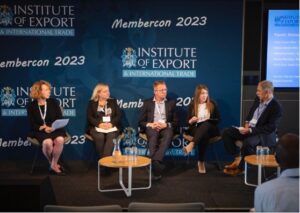The importance of compliance in global trade at IOE&IT’s Membercon
Topics

The TariffTel team were at the Institute of Export and International Trade Membercon 2023 event in Liverpool which brought together industry leaders and visionaries to discuss all the challenges and issues they’re seeing today in global trade. It was a chance to hear from experts on important topics such as freeports, green trade and export controls and a time to collaborate, ask questions and learn from success stories from businesses that have overcome hurdles when exporting and importing goods internationally.
 Our Head of Sales, Darren Wareing, was invited to be involved in a panel discussion on ‘Managing the costs of international trade’, which was a jam-packed session, clearly appealing to many business leaders and supply chain executives who face increasing costs relating to export controls across their supply chain. As part of the panel, compliance in customs procedures, including assigning correct HS codes to goods at the start of their journey in the supply chain, was a big focus. The costs of non-compliance are significant, and whilst the process of getting things right is complex, the panel discussed the resources that are available to businesses to make things simpler and quicker.
Our Head of Sales, Darren Wareing, was invited to be involved in a panel discussion on ‘Managing the costs of international trade’, which was a jam-packed session, clearly appealing to many business leaders and supply chain executives who face increasing costs relating to export controls across their supply chain. As part of the panel, compliance in customs procedures, including assigning correct HS codes to goods at the start of their journey in the supply chain, was a big focus. The costs of non-compliance are significant, and whilst the process of getting things right is complex, the panel discussed the resources that are available to businesses to make things simpler and quicker.
Having expertise within your team plays an important part in meeting compliance standards. A well-trained, knowledgeable team can support your business in understanding the terminology, processes and requirements involved, but technology and automated product classification solutions like TariffTel, can transform operations and ensure compliance is met for every single product. This is particularly true when managing large numbers of SKUs each month.
As Darren said, “The reality of penalty fines and delayed shipments if HS codes are wrong, or you have incorrect paperwork on customs declarations, are not worth contemplating. HMRC can issue fines for incorrect classification, especially if duty has been under declared and under paid. If a shipment is held at customs because the paperwork or customs entry isn’t correct, then demurrage or storage costs can be incurred. This is much worse at the port of entry. A British retailer had ocean containers held in the US due to border control difficulties. US customs required extra details about product composition and manufacturer documentation. This resulted in very high demurrage costs plus loss of sales, and reputational damage.”
Another complication is that HS codes can change regularly according to updates to the Harmonised System that standardises numerical methods of classifying traded products and is used by customs authorities worldwide. This means using out-dated HS codes can be more common than people think. Find out more on the intricacies of HS codes.
Business can safeguard against this by working with a platform that automatically updates these changes as and when they happen, like TariffTel. Also, by tapping into the valuable resource of the teams behind the technology who work hard to keep systems updated. These teams have a wealth of knowledge and experience to help businesses understand even the most complex of classifications.
There was also discussion about customs systems not marrying up with each other that can cause added confusion for businesses trying to navigate the correct approach. For example, in the past, some businesses have experienced problems with Export Health Certifications (EHC) and the tariff book not matching up. For food exporters this presents a problem that the panel agreed needed to be addressed by HMRC.
The panel then moved on to discussions around supply chain efficiency and the role of technology in managing international trade costs. Darren explained, “Data is everywhere and in various forms. This unfortunately creates data silos which are an operational overhead with teams having to go to many systems and sources to manually create reports. It’s inefficient, time consuming, and not always reliable.
The key is to centralise your data from single verified sources, rather than from multiple sources, department or people. Make sure you reference the data and don’t duplicate anywhere else. By using robust integrations, such as industry standard API’s, you can enable rapid data exchanges between all parties and avoid disparate systems, giving you one single version of the truth.”
Membercon2023 proved a great event to discuss and debate the complexities of global trade. For anyone who missed the event, or who attended and would like to pick up discussions on what a trusted customs classification solution such as TariffTel can achieve for your business, please get in touch. We are happy to share how we support long-standing customers such as M&S, Primark and ASDA with their customs classification, ensuring compliance and visibility across export controls and procedures.
Other Useful Resources
Windsor Framework update: Key details ahead of 1st May 2025 implementation
The Windsor Framework's latest updates come into effect on 1st May 2025, introducing new trading arrangements between Gr...
From spreadsheet chaos to smart compliance
Data accuracy matters more than you think in customs classification. In global trade, the difference between complian...
Adapting to an ever-changing regulatory environment
In the fast-moving world of international trade, compliance is more than just a legal necessity; it’s a competitive ad...



